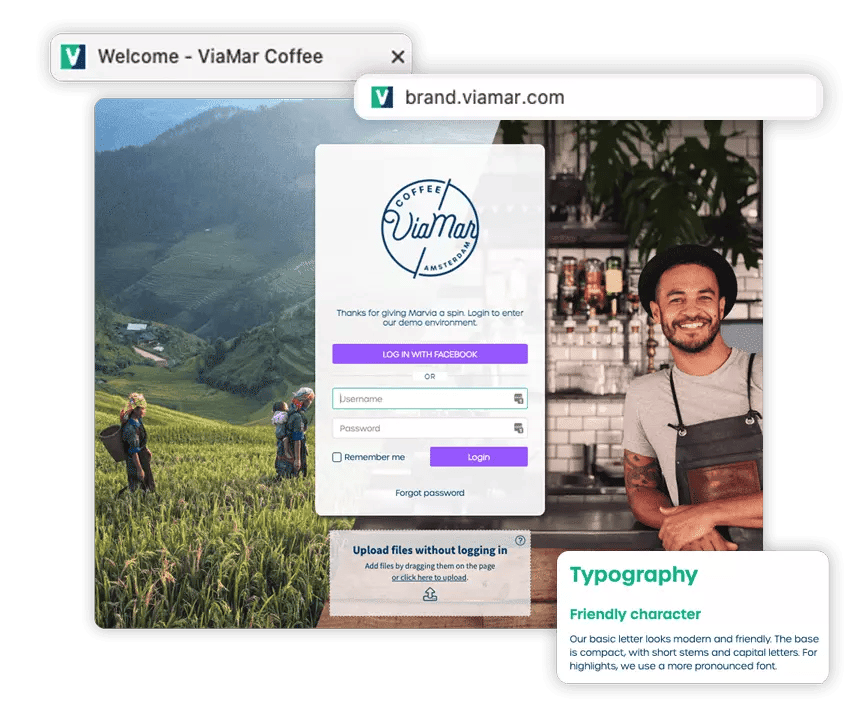What is Local Marketing
Many companies spend much time promoting their brand to an audience as big as possible, optimizing strategies, leveraging new channels, and developing distinctive campaigns. An element that is sometimes overlooked, even though it's essential to a good marketing strategy, is a local marketing strategy.
This comprehensive guide discusses all the important facets of local marketing and gives you tools and tips to get started.
Contents
The value of local marketing
Read MoreUnlock your potential with Local Marketing Automation
Read More1. What is Local Marketing?
We don't want to sound too much like a high school essay, but let's start this guide with a definition of Local Marketing. There are several definitions to be found, but we will use the definition below when talking about local marketing.
 What is local marketing?
What is local marketing?
Local marketing is a marketing strategy where you target local or regional audiences, often within a certain radius of your company's physical location(s). Local marketing is therefore often called local store marketing or neighborhood marketing.
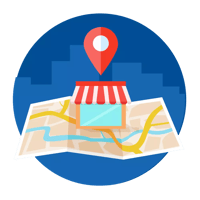
Local marketing involves adapting components in the marketing mix to local conditions and characteristics. For a very basic example, think of translating your campaign into the language your target audience speaks. You can also get very technical and adapt your marketing materials to the weather conditions at specific DOOH locations.
By adapting to a specific location or audience, you're better able to connect to them, which is a great way to build trust. Local marketing can be done in big ways, small, online, offline... The options are endless. It's also not just reserved for smaller, local companies. Multinationals also greatly benefit from localizing their marketing efforts to connect to their audiences.
2. Benefits of local marketing
Consumers are actively seeking out business reviews at a local level, engaging on social media to share their experiences with local stores and restaurants, and checking the operating hours of nearby branches of national brands.
To elevate your brand's presence, it is essential to prioritize local visibility and performance. Investing in local marketing provides a multitude of benefits, and we have outlined the most significant ones for you:
Reach the right audience
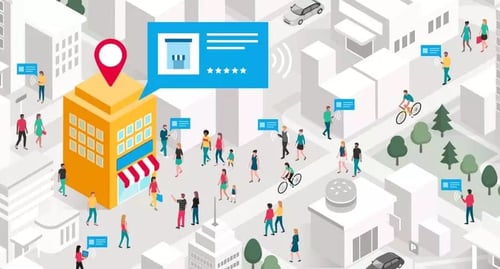
Successful marketing isn't just about reaching a broad audience; it's about connecting with the individuals who are actively seeking your products or services in your local area. These are the customers who are most likely to engage with your brand and make purchases. No one is looking for a hairdresser 2 towns over or a restaurant in another state (at least, not usually). Shopping locally is convenient, it means less travel time and the option to quickly get something last-minute. Sounds good, right?
Leverage local market insights
Understanding the unique nuances of each market is key to the success of tailored marketing campaigns for different regions. By localizing your approach, you shift the emphasis from broad outreach to pinpointed relevance, showcasing your understanding of the local market and building a deeper connection with customers.
Local marketing is cost-effective
 In this ROI-driven world, getting the most out of your marketing budget is essential. We'll get more into it, but there are several great strategies and channels for local marketing that are completely free, like most social media platforms.
In this ROI-driven world, getting the most out of your marketing budget is essential. We'll get more into it, but there are several great strategies and channels for local marketing that are completely free, like most social media platforms.
Furthermore, by linking your brand directly to local consumers who are truly interested, localized marketing campaigns prove to be more lucrative than expansive corporate efforts aimed at a broader audience. Local marketing also harnesses the power of word-of-mouth marketing, which is both cost-effective and highly trusted.
3. Examples of great local marketing campaigns
Effective local marketing strategies involve resonating with your local audience in meaningful ways. This could mean participating in local events, collaborating with local influencers, or maintaining separate location accounts to highlight their unique identities without overshadowing the corporate brand.
Because examples help with learning, we've put together a list of 15 examples of great local marketing. Below are three of those examples, click this link to see all of them (after you're done reading this, of course).
British Airways' "A British original"
The question "Are you here for business or leisure" is one ubiquitous with airport travel. It's also a question that can be hard to answer when your reason for travel doesn't neatly fit into those categories.
The British Airways campaign features 500 unique print, digital, and outdoor executions, each showing the binary choice between business and leisure, and a third, different, choice. These third options are amazing examples of local programmatic marketing. Some are geared to specific locations ("Warm gusts of air that don't come from tube trains."), others to weather conditions ("Because this weather sucks."), and others are more general ("Mischief."). The campaign also covers videos that strike a more emotional cord.
Neighborhood beers from local brewery
Tiger Beer's collaboration with the Singapore Tourism Board resulted in 20 neighborhood-themed beers known as Tiger District Bottles. These unique designs represent each district's culture, with 4 designs brought to life through Augmented Reality technology.
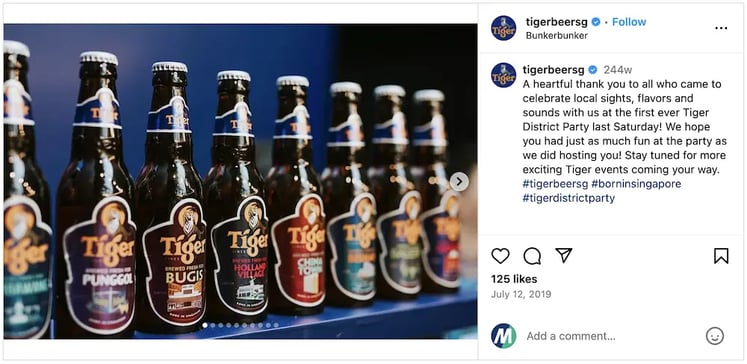 Even though Tiger Beer operates in over 50 markets worldwide, they remain deeply connected to their roots in Singapore, actively engaging with local customers in the city's various districts. By collaborating with the Singapore Tourism Board to promote tourism, the original Singaporean beer brand is driven by a profound passion to showcase the essence of Singapore to both locals and the global community. Through this innovative campaign, they provide a platform for local artists to shine and express the vibrant culture of Singapore.
Even though Tiger Beer operates in over 50 markets worldwide, they remain deeply connected to their roots in Singapore, actively engaging with local customers in the city's various districts. By collaborating with the Singapore Tourism Board to promote tourism, the original Singaporean beer brand is driven by a profound passion to showcase the essence of Singapore to both locals and the global community. Through this innovative campaign, they provide a platform for local artists to shine and express the vibrant culture of Singapore.
Localized McMenu items

McDonald's can be found almost everywhere on the planet (sorry Antartica). Despite its vast reach, capturing the hearts of local customers can be a challenge for such a renowned brand. With iconic offerings like the Big Mac featured on menus worldwide, McDonald's stands out for its consistent taste no matter where you indulge.
However, McDonald's uses local foods to supplement their classic menu. You can get poutine in Canada, the McKroket in the Netherlands, and Le Croque McDo in France. By incorporating local culinary traditions, McDonald's not only connects with their community but also offers a delightful culinary adventure for tourists to explore.
All business is local
Plan a free demo to see how Marvia supports local marketing efforts.
4. Reasons why size doesn't matter
Local marketing isn't just for smaller, local companies. It is just as beneficial for companies that are internationally or globally active. Why? We'll tell you below.
Your customers are local
Makes sense, right? Your business serves the people that live in that area (and an occasional tourist). People usually don't go out of their way to a different city when they can go around the corner instead. When you reach out to your local customers, they will come to you.
And not only are your customers local, but they also search locally for the same reasons. Local search has boomed in the last couple of years and doesn't stop growing. The addition of local search functions in apps like Instagram extends the importance of local search and local findability - for all brands.
Local reviews mean more
 Reviews about a specific location tell potential customers much more than reviews of your brand overall. If the real-life shopping experience is bad, that is what the customer will remember.
Reviews about a specific location tell potential customers much more than reviews of your brand overall. If the real-life shopping experience is bad, that is what the customer will remember.
So, pay attention to the feedback you get, and show that you adapt accordingly. Have your local partners be the ones to react to the review for an extra local touch. If you show your local customers that you're looking out for their personal experience, they will reward you by becoming returning customers.
It humanizes your brand
The distance between the head office and their local customers can be very big, especially when talking about global brands. You can close this gap by being present and investing in your local communities.
You can do this by getting involved in local events or making local store managers the face of that location. Whatever you do, make sure it's authentic and that it adds value to the community. That way, you'll be more than just a brand name to your customers, you'll be someone they recognize in their community.
Sounds good right? Localization is what truly connects your brand to your customers. So whether you're a large company or a small one, make sure you adapt to the local communities that you serve.
Want to know more about the benefits?
Read why you should invest in local marketing, no matter the size of your business5. Local marketing strategy
Local marketing is an important component of your overall marketing strategy. A good local marketing strategy will lead to a boost in your business’s visibility and sales, so it’s important to get it right before you get started and go through the elements that make up your strategy. We'll go over some steps you need to take to create a local marketing strategy.
Research your local market
Of course, you want to know your local market and audience before you create your strategy, so you do market research before you enter the market and update this information while you’re there. The range of important elements to keep in mind is broad, ranging from language and local dialects to laws and regulations. Consider hiring local specialists or visiting your target market.
Localize your website
Localizing your website ensures a better user experience by providing relevant information like nearest location and opening hours, eliminating the need to search through locations and enhancing the decision-making process for customers.
Optimizing your website for mobile search is crucial as consumers increasingly use their mobile phones to search for purchases. According to Hubspot’s 2023 State of Marketing Report, “40% of marketers say that mobile-friendly website design and mobile messaging (...) is the most effective trend they’re currently leveraging”. A useful tool to check whether your website is mobile-friendly is Google’s Mobile-Friendely Test tool.
Invest in local SEO
Localizing your website and creating local pages are important parts of local SEO. In addition, managing your local listings, local listing management, is also an important component, but we'll talk more about that in a moment.
A few local SEO tips:
- Localize title tags with city and street names;
- Add local bussiness schema to your pages;
- Make sure you have a localized URL structure;
- Provide relevant inbound links;
- Write locally relevant content such as:
- Tell about local clients or completed projects;
- Highlight local sponsorships or memberships in local industry associations;
- Promote local events or meetings.
Make sure your location data is always up-to-date, for example, if you open or close new branches, your opening hours change or something changes in your product range.

All of this will also contribute to the so-called “snack pack” results. This is the framed area on the first results page when you do a local search in Google. This snack pack shows the three most relevant local business listings for the search.
This brings us to probably the most important part of your local SEO strategy: claiming and setting up your Google Business Profile account.
Claim local listings
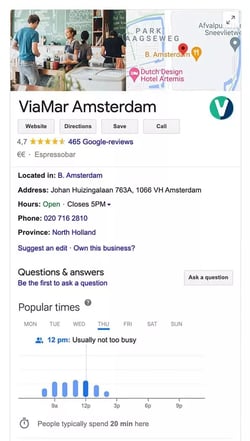 Claiming your business on local listings and third-party websites is an amazing way to gather reviews and customer feedback, and offer another route to reach your target audience. The most important local listing to claim is your Google Business Profile. You can also think of websites like Bing Places, Apple, Yelp, websites specific to your industry, or local directories. These websites create valuable backlinks to your website and help increase your word-of-mouth marketing.
Claiming your business on local listings and third-party websites is an amazing way to gather reviews and customer feedback, and offer another route to reach your target audience. The most important local listing to claim is your Google Business Profile. You can also think of websites like Bing Places, Apple, Yelp, websites specific to your industry, or local directories. These websites create valuable backlinks to your website and help increase your word-of-mouth marketing.
Be active in your local community
When you support your local community, that local community is very likely to support you as well. Be present at local events, or sponsor them if you can’t be there in person. Or collaborate with other (established or new) businesses in your community. This increases your visibility and shows you care about giving back to the community.
Go local on social media
Social media is an amazing way to directly engage with your local audience. Most platforms offer a lot of options to localize your account, from tagging locations to the use of local hashtags. Creating individual accounts for locations or holding localized contests is also a great way to leverage local social media channels.
Don’t forget local media
Even though local media may not have the budget or reach of local media, it’s likely that your local customers listen to or read the local news through those local channels. So make sure to invest in them! Neighborhood newspapers, local radio, try to find the ones your target audience uses and get in there.
6. Brand localization as a part of local marketing strategy
Your branding is an integral part of your marketing strategy. And, as you localize your overall marketing strategy, you also need to look at your brand when entering local markets. You may need to adapt your tone of voice, how you present your company culture, or even your brand name and taglines. Consumers might have different opinions on how they expect brands to interact with them, and the other way around. Three things to keep in mind when localizing your brand:
Leverage local marketing channels and influencers.
Meeting local audiences where they are can be taken to a new level by choosing local newspapers/radio stations/etc. over (inter)national ones. It shows that you, as a brand, are looking beyond the usual channels available to you. The same goes for local influencers. They are actual members of the community and a trusted source of recommendations for consumers.
Remember your multilingual SEO
Since people are likely to search online in a language they use themselves, localizing your SEO improves your visibility. Think about using language indicators in your URLs, applying Hreflang attributes, and translating metadata. It is beneficial to ensure that the language menu is easily accessible on the front end, either as a part of the menu or as a pop-up when users first visit a page.
Keep a country-specific brand guide
We all know why having a solid brand guide is important. But adding guides for your specific markets is very helpful. Localized style guidelines skip the basic info and focus on the adaptations specific to that market. This doesn't just make it useful as a reference, it also helps steer your local marketing to lessen the risk of rogue localized marketing content.
Already a pro in brand localization?
Click the button to become a pro in content localization too!7. The six most useful local marketing channels
 We can assume that most marketers are familiar with most marketing channels, so we won't have to go into all of them when discussing local marketing. So, we'll just highlight six important marketing channels for local marketing.
We can assume that most marketers are familiar with most marketing channels, so we won't have to go into all of them when discussing local marketing. So, we'll just highlight six important marketing channels for local marketing.
- Reviews. We've mentioned them before, but reviews are incredibly valuable for you and your customers. Reviews showcase how much your customers love your products, of course, but also how you deal with negative feedback. Make sure to take negative reviews seriously, truly listen to your customers, and take in their feedback to improve your product and their experience.
- (D)OOH advertising. Ever been fully emerged in your role as passenger royalty and gotten distracted by a billboard on the side of the road? Digital Out Of Home advertising leverages video, music, location data, and additional real-time information in order to get you to look up from your phone. It's a direct and highly visible marketing channel, and with many programmatic DOOH platforms, it's very easy to utilize.
- Direct mail. If you're looking to reach people in a certain area, using direct mail is a great addition to your online marketing efforts. It certainly stands out more than the millions of digital marketing expressions people encounter every day, and if you include an interactive element such as a QR code, it's easy to track the yield.
- Live marketing. Curious who actually walks through (or past) your doors? Opening a new location? This is a great opportunity to take your customers from a persona to a person and meet them IRL! Take to the streets with flyers, special offers, or performers to lead passers-by to your location. A sub-category of life marketing is guerrilla marketing, which is the same thing as live marketing, only without a permit. Perform at your own risk.

- Local influencers. Local influencers can help you build that trust in the community through their ability to create authentic and culturally relevant content. Many local influencers also reflect a specific niche in the community. You can reach a highly specific and targeted audience by collaborating with them.
- Speaking of local influencers, we can't forget user-generated content. Though influencers are still trusted by consumers in general, the recent "deinfluencing" trend sees consumers (especially Gen Z consumers) becoming less trusting of slick influencer campaigns. User-generated content is a great alternative or addition. Reposting your audience's content doesn't eat into your budget, shows your product in an authentic setting, and increases engagement with your current and target audience.
8. Challenges of local marketing
Everything in life has its challenges, and local marketing is no exception. Let's go over some of the more common troubles seen in local marketing.
1. No sincere involvement
We've emphasized the significance of community involvement earlier. What truly matters is the authenticity of this engagement. Consumers value genuine connections with their community. If they sense that you view them only as a revenue source, it could harm your business. Reflect on how you demonstrate your involvement, ensuring it aligns authentically with your company values.
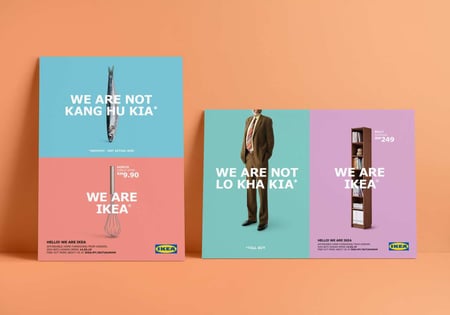
2. A lack of creativity
A local campaign shouldn't have the same creative as an international brand campaign with a different store name slapped on the poster. It should speak to your local audience. One source of creativity for your campaigns is the people working in your customer-facing locations. Since they are members of the local community, they know which hooks can be used and which events can be leveraged. Make sure to put that knowledge to good use!
3. No automation
Automation plays a crucial role in enhancing marketing efforts, and this holds particularly true for local marketing. Consider the tedious task of manually inputting addresses and opening hours for each of your 100 locations. Now envision automating this process seamlessly. The efficiency and cost-saving benefits of utilizing the right automation tools become evident.
4. No knowledge-sharing
Local marketing achievements are often kept within the confines of the local team, missing out on the chance to inspire and engage others in the company. It is crucial to establish effective strategies for sharing these wins and providing constructive feedback when necessary. Bringing together local managers to review past campaigns and implement successful tactics in future endeavors is key to maximizing the impact of your local marketing efforts.
5. Disconnect from your brand
It can be harmful to your brand if local campaigns don't comply with brand guidelines and look and feel disconnected from the brand. Luckily, there are several ways even large organizations can stay on-brand, like working with dynamic templates. They allow your local partners freedom to build their own marketing materials, without them (or you) worrying about whether that material follows brand guidelines.
Too challenging? No way!
Marvia solves and prevents these problems. How? Ask one of our experts.
9. Local Marketing Tools
To make life easier for marketers, there are a tremendous number of useful tools that make performing local marketing a lot easier and more efficient. We listed a few essential tools for you.
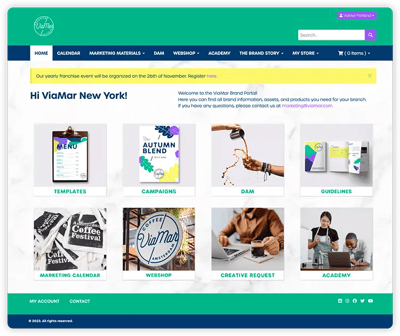
Distributed Marketing Software
Local marketing thrives on the efficiency of streamlining your marketing efforts in a unique way. Say hello to your future go-to tool: a Distributed Marketing or Local Marketing Automation platform.
A distributed marketing platform assists local and national marketers in streamlining their efforts by consolidating marketing messages, campaigns, products, and location data. It also enables easy localization and distribution of content across various channels.
But saving time and money aren't the only benefits:
- It gives you comprehensive analytics of user- and location-specific information to increase participation and optimize marketing campaigns.
- You have the flexibility to customize extensive campaigns for specific regions, markets, and customers with minimal effort. This leads to improved outcomes and eliminates the risk of targeting the wrong audience.
- Centralizing and utilizing templates helps protect the integrity of your meticulously crafted brand, ensuring a uniform brand experience across all locations and regions.
Want to know more about the benefits?
4 ways local marketing automation can help you reduce marketing costs
Local SEO platform
Platforms such as BrightLocal and Moz Local are essential for enhancing and monitoring your local SEO performance. These tools enable you to easily keep track of your local rankings, evaluate your Google Business Profile performance, analyze your backlink profile compared to competitors, and gain valuable insights into the search behavior of local searchers. Incorporating these tools into your local search strategy is crucial for optimizing your search results effectively.
Review Management
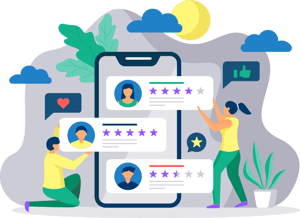 Review management tools like ReviewTrackers provide valuable insights into customer perspectives through reviews. These tools not only assist in monitoring, analyzing, and responding to reviews but also highlight areas where you may be losing market share locally. They offer a comparison of your business performance against local competitors and offer guidance on building stronger connections with customers to enhance the overall customer experience.
Review management tools like ReviewTrackers provide valuable insights into customer perspectives through reviews. These tools not only assist in monitoring, analyzing, and responding to reviews but also highlight areas where you may be losing market share locally. They offer a comparison of your business performance against local competitors and offer guidance on building stronger connections with customers to enhance the overall customer experience.
Local Listing Score
Semrush and Moz offer a convenient free tool that provides users with valuable insights into their visibility across different directories like Google, Facebook, and Bing. These local business listings play a significant role in local SEO, as highlighted earlier.
Brand Management Software
When operating on a local scale as an organization, it is crucial to maintain consistent branding across all levels. Any inconsistencies in brand portrayal can lead to significant financial implications for your business. Implementing brand management software is key to ensuring a seamless global-to-local strategy.
Brand management platforms typically provide a centralized hub for all your brand assets, including a digital asset management (DAM) system, a comprehensive digital brand guide, and customizable templates. This ensures that all team members can easily create marketing materials that align with your brand standards.
Some solutions also offer other features to ensure that you keep a grip on your brand such as a marketing calendar or a marketing shop where branded products and promotional materials can be ordered by your local partners.

Is your toolkit looking empty?
Let our experts show you how Marvia's tools of the trade can help you
Get started with local marketing!
Hopefully, after reading this guide, you have become a local hero. The important thing to remember is that local marketing is a valuable addition to your existing marketing strategy, regardless of the size of your organization. Remember, you don't have to be small to be local!
You can go a long way with the right tools and technology, but in the end, you achieve more together than alone. Although your national marketing team will undoubtedly have the right expertise, your local partners ultimately know their market and customer best. Leverage that knowledge; be where your customer is in a way that is both recognizable as the national brand and feels personal and local at the same time.
Additional local focus can lead to surprising results and is a must if you want to stay ahead of the competition. Remember:
